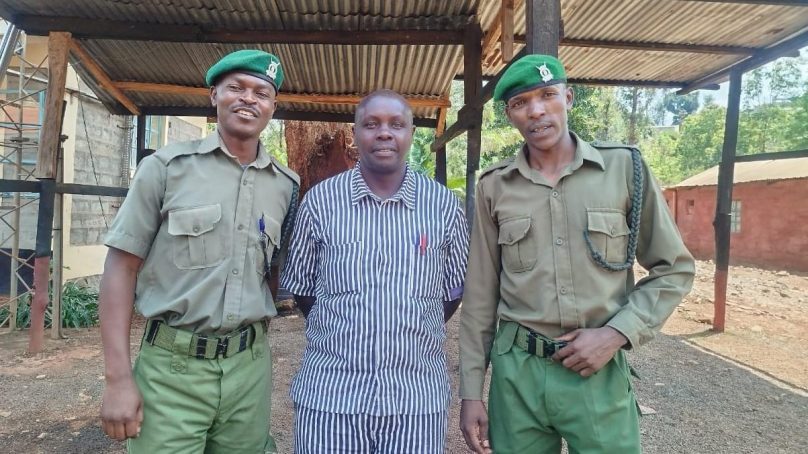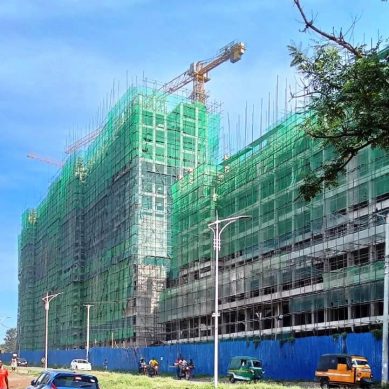
After spending 24 years behind bars, Peter Kihiu Mwaniki, has finally regained freedom not as the man he once was, but as a transformed figure determined to use his second chance in life to fight for justice and inspire others.
His journey from a condemned prisoner to a lawyer is one of resilience, faith and redemption. Mwaniki, who hails from Nyandarua County was only 22 years when life took a turn for the worse.
A few minutes before his release on Friday (October 24), Mwaniki revealed that before his arrest he worked for an Indian employer in Nairobi, a man who trusted him deeply and even offered him a job and a place to live. But youthful recklessness and bad influence led him astray.
“Because of my age and greed for money, I was tempted into stealing when my boss was abroad for business,” he recalls.
Together with a group of friends, he stole gold accessories, dollars and cameras worth about Ksh2 million.
“I betrayed my employer’s trust. He published my photo and other personal details in newspapers as a wanted person and the authorities came looking for me,” Mwaniki explained, his voice heavy with remorse.
In 2002, he was convicted of robbery with violence and sentenced to death. “I was devastated when the court sentenced me, it felt like it was the end of everything,” he reflected.
His first appeal in 2005 was declined, and another one later also failed. However, in 2009, during President Mwai Kibaki’s tenure, his death sentence was commuted to life imprisonment, which in a way gave him some relief.
That hope grew brighter in 2019 when a petition successfully reduced his sentence to 10 years. By then, Peter had already begun transforming his life behind bars. He served his imprisonment in Kamiti Maximum and Medium Prisons, then in Naivasha, Shimo la Tewa, Nyeri and Murang’a prisons, where he chose to study instead of despair.
Before his conviction, Mwaniki had completed his KCSE examinations, scoring a C plain. This made him one of the most educated inmates in the correctional facility, which in turn paved the way for him to begin his academic journey while in prison.
Through KASNEB, he studied accounting, commerce and storekeeping, completing eight units in three years between 2002 and 2005. He also undertook theological and chaplaincy courses, which helped him grow spiritually and serve as a mentor to others.
In 2016, his determination caught the attention of Justice Defenders (formerly African Prisons Project), a non-governmental organisation that sponsors inmates to pursue legal studies.
Through their support, Mwaniki enrolled for a law degree at the University of London, taking his classes through correspondence and virtual lectures.
“Education gave me a sense of purpose,” he narrates, adding “It reminded me that even behind bars, I could still build something meaningful.”
After years of perseverance, he graduated in 2023 alongside 27 other inmates from across the country, which he says is a proud milestone to him.
Now free, Mwaniki is hoping to join the Kenya School of Law, where he hopes to undertake advocacy training and become an advocate. His dream is to use his legal knowledge to support inmates and marginalised people seeking justice.
“I want to help prisoners understand court processes, how to mitigate, file appeals and defend themselves in fair hearings,” he explains.
Even while in prison, he helped fellow inmates write appeals and submissions, guiding them through complex legal procedures.
Beyond his academic achievements, Mwaniki’s faith has been a crucial anchor throughout his imprisonment.
“I have remained spiritually strong despite minor health challenges; God has been with me all through,” he observes.
His family and the church have also been a source of strength, maintaining close contact with him and supporting his transformation.
“They never abandoned me; they walked with me through my lowest moments and I’m forever grateful to them,” Mwaniki added.
As he prepares to rebuild his life, Mwaniki acknowledges the social stigma that comes with being an ex-convict.
“It’s one of the biggest challenges; People tend to judge you by your past. But I want to prove that we can reform, that we can contribute meaningfully to society,” he explains.
He appealed to the public to be more accommodative of reformed ex-prisoners and to give them opportunities to rebuild their lives.
“I urge society to learn to welcome people from prison, give them a chance to catch up with life and live honestly,” he urged.
Mwaniki hopes his story will serve as a lesson and an inspiration to the youth affirming that he lost his youth to prison.
George Milanya, the Deputy Officer in Charge of Murang’a Prison, described Mwaniki as influential, disciplined and of good conduct throughout his stay.
Milanya said that when Mwaniki was interviewed by the Discharge Board, he was found to be ready for reintegration into society. He also disclosed that the Probation Officer had also provided a report confirming that Mwaniki’s home environment and community were prepared to receive him.
“Mwaniki has shown remarkable transformation both academically and behaviourally. He has served as a mentor and role model to fellow inmates and is a true example of successful rehabilitation,” Milanya said.
The officer noted that Murang’a Prison focuses on rehabilitating inmates through education and skills training, offering courses in masonry, carpentry, and farming, among others where they admit them according to their areas of interest.
“We also partner with the National Industrial Training Authority (NITA) to examine and certify inmates who complete vocational training. This helps them reintegrate easily into society upon release,” he noted.
Milanya acknowledged that stigma and unemployment remain major challenges facing ex-prisoners after release but urged society to give reformed individuals a fair chance to rebuild their lives.
“The community must learn to accept and support those who have served their sentences. Rehabilitation only succeeds when society plays its part,” he emphasised.
- A Tell Media / KNA report / By Bernard Munyao







